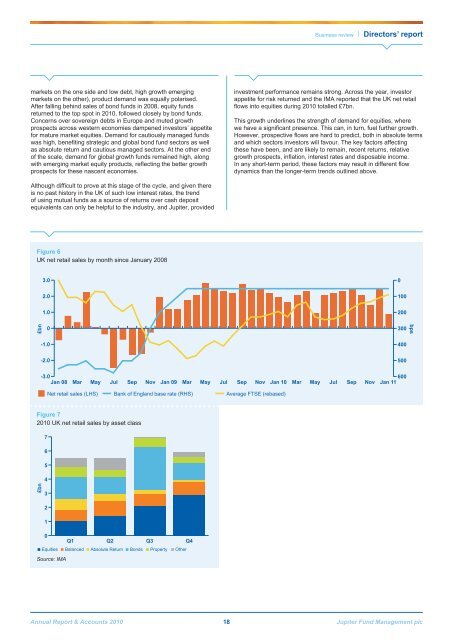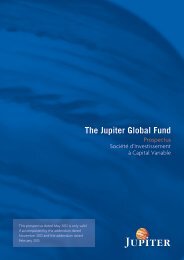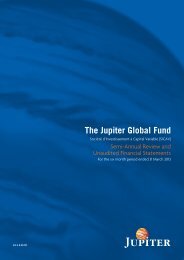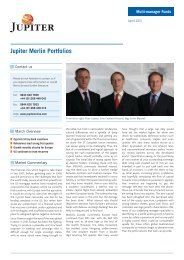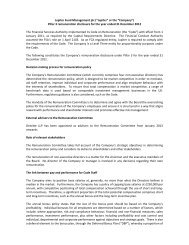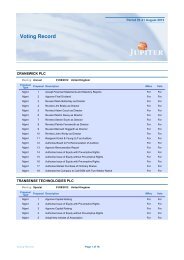Jupiter Annual Report 2010 - Jupiter Asset Management
Jupiter Annual Report 2010 - Jupiter Asset Management
Jupiter Annual Report 2010 - Jupiter Asset Management
Create successful ePaper yourself
Turn your PDF publications into a flip-book with our unique Google optimized e-Paper software.
Business review | Directors’ report<br />
markets on the one side and low debt, high growth emerging<br />
markets on the other), product demand was equally polarised.<br />
After falling behind sales of bond funds in 2008, equity funds<br />
returned to the top spot in <strong>2010</strong>, followed closely by bond funds.<br />
Concerns over sovereign debts in Europe and muted growth<br />
prospects across western economies dampened investors’ appetite<br />
for mature market equities. Demand for cautiously managed funds<br />
was high, benefiting strategic and global bond fund sectors as well<br />
as absolute return and cautious managed sectors. At the other end<br />
of the scale, demand for global growth funds remained high, along<br />
with emerging market equity products, reflecting the better growth<br />
prospects for these nascent economies.<br />
investment performance remains strong. Across the year, investor<br />
appetite for risk returned and the IMA reported that the UK net retail<br />
flows into equities during <strong>2010</strong> totalled £7bn.<br />
This growth underlines the strength of demand for equities, where<br />
we have a significant presence. This can, in turn, fuel further growth.<br />
However, prospective flows are hard to predict, both in absolute terms<br />
and which sectors investors will favour. The key factors affecting<br />
these have been, and are likely to remain, recent returns, relative<br />
growth prospects, inflation, interest rates and disposable income.<br />
In any short-term period, these factors may result in different flow<br />
dynamics than the longer-term trends outlined above.<br />
Although difficult to prove at this stage of the cycle, and given there<br />
is no past history in the UK of such low interest rates, the trend<br />
of using mutual funds as a source of returns over cash deposit<br />
equivalents can only be helpful to the industry, and <strong>Jupiter</strong>, provided<br />
Figure 6<br />
UK net retail sales by month since January 2008<br />
3.0<br />
2.0<br />
1.0<br />
0<br />
100<br />
200<br />
£bn<br />
0<br />
300<br />
bps<br />
-1.0<br />
400<br />
-2.0<br />
500<br />
-3.0<br />
Jan 08<br />
Mar<br />
May<br />
Jul<br />
Sep<br />
Nov<br />
Jan 09<br />
Mar<br />
May<br />
Jul<br />
Sep<br />
Nov<br />
Jan 10<br />
Mar<br />
May<br />
Jul<br />
Sep<br />
Nov<br />
600<br />
Jan 11<br />
Net retail sales (LHS)<br />
Bank of England base rate (RHS)<br />
Average FTSE (rebased)<br />
Figure 7<br />
<strong>2010</strong> UK net retail sales by asset class<br />
7<br />
6<br />
5<br />
4<br />
£bn<br />
3<br />
2<br />
1<br />
0<br />
Q1<br />
Q2<br />
Q3<br />
Q4<br />
Equities Balanced Absolute Return<br />
Bonds<br />
Property<br />
Other<br />
Source: IMA<br />
<strong>Annual</strong> <strong>Report</strong> & Accounts <strong>2010</strong> 18 <strong>Jupiter</strong> Fund <strong>Management</strong> plc


